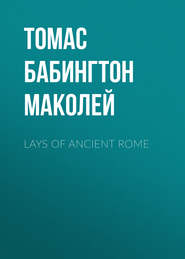По всем вопросам обращайтесь на: info@litportal.ru
(©) 2003-2024.
✖
Critical and Historical Essays. Volume 1
Настройки чтения
Размер шрифта
Высота строк
Поля
UGOLINO See Dante’s Inferno, xxxii., xxxiii.,
VANSITTART, was governor of Bengal in the interval between Clive’s first and second administrations.
Vattel, the great jurist whose Droit des Gens, a work on Natural Law and its relation to International Law, appeared in 1758.
Vellore, west of Arcot.
Verres, the Roman governor of Sicily (73-77 B.C.), for plundering which island he was brought to trial and prosecuted by Cicero.
Virgil’s foot race. In Aeneid v. 325 ff it is told how Nisus, who was leading, tripped Salius, his second, that his, friend Euryalus might gain the prize.
WALDEGRAVE, Lord, Governor to George III. before the latter’s accession; married Walpole’s niece.
Wallenstein, Duke of Friedland, the ablest commander on the Catholic side in the Thirty Years’ War.
Warburg, like Minden 1759, a victory gained by Ferdinand of Brunswick over the French (1760).
Watson, Admiral, made no protest against his name being signed, and claimed his share of the profits.
Western, Mrs. See Fielding’s Tom Jones.
Whithed, Mr. W., Poet-laureate from 1757 to 1785; author of the School for Lovers, etc.
Wild, Jonathan, a detective who turned villain and was executed for burglary in 1725; the hero of one of Fielding s stories.
Williams, Sir Charles Hanbury, Ambassador to Berlin (1746-49), His satires against Walpole’s opponents are easy and humorous (d. 1759).
Winnington. In turn Lord of the Admiralty, Lord of the Treasury, And Paymaster of the Forces. He had infinitely more wit than principle.
Wood’s patent the permission granted to Wood of Wolverhampton to mint copper coin for Ireland, which called forth Swift’s Drapier Letters.
YORKE, Attorney-General; Earl of Hardwicke (q.v.).
ZEMINDARS, landholders,
Zincke and Petitot, eighteenth and seventeenth century enamel painters who came to England from the Continent.
VANSITTART, was governor of Bengal in the interval between Clive’s first and second administrations.
Vattel, the great jurist whose Droit des Gens, a work on Natural Law and its relation to International Law, appeared in 1758.
Vellore, west of Arcot.
Verres, the Roman governor of Sicily (73-77 B.C.), for plundering which island he was brought to trial and prosecuted by Cicero.
Virgil’s foot race. In Aeneid v. 325 ff it is told how Nisus, who was leading, tripped Salius, his second, that his, friend Euryalus might gain the prize.
WALDEGRAVE, Lord, Governor to George III. before the latter’s accession; married Walpole’s niece.
Wallenstein, Duke of Friedland, the ablest commander on the Catholic side in the Thirty Years’ War.
Warburg, like Minden 1759, a victory gained by Ferdinand of Brunswick over the French (1760).
Watson, Admiral, made no protest against his name being signed, and claimed his share of the profits.
Western, Mrs. See Fielding’s Tom Jones.
Whithed, Mr. W., Poet-laureate from 1757 to 1785; author of the School for Lovers, etc.
Wild, Jonathan, a detective who turned villain and was executed for burglary in 1725; the hero of one of Fielding s stories.
Williams, Sir Charles Hanbury, Ambassador to Berlin (1746-49), His satires against Walpole’s opponents are easy and humorous (d. 1759).
Winnington. In turn Lord of the Admiralty, Lord of the Treasury, And Paymaster of the Forces. He had infinitely more wit than principle.
Wood’s patent the permission granted to Wood of Wolverhampton to mint copper coin for Ireland, which called forth Swift’s Drapier Letters.
YORKE, Attorney-General; Earl of Hardwicke (q.v.).
ZEMINDARS, landholders,
Zincke and Petitot, eighteenth and seventeenth century enamel painters who came to England from the Continent.
Другие электронные книги автора Томас Бабингтон Маколей
Lays of Ancient Rome




 4.67
4.67












